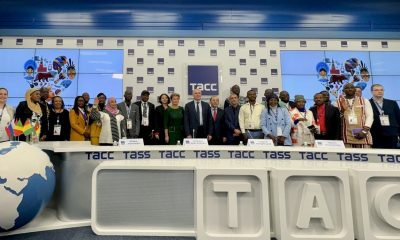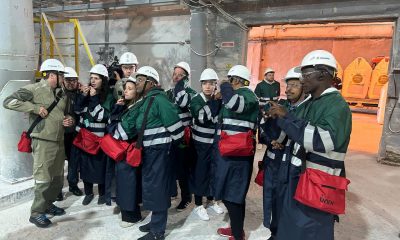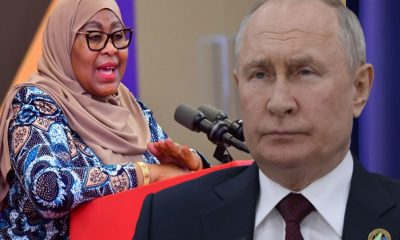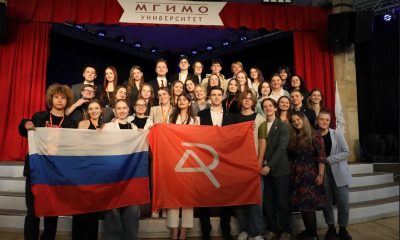World
Russian and African Legislators Meet, What Next?
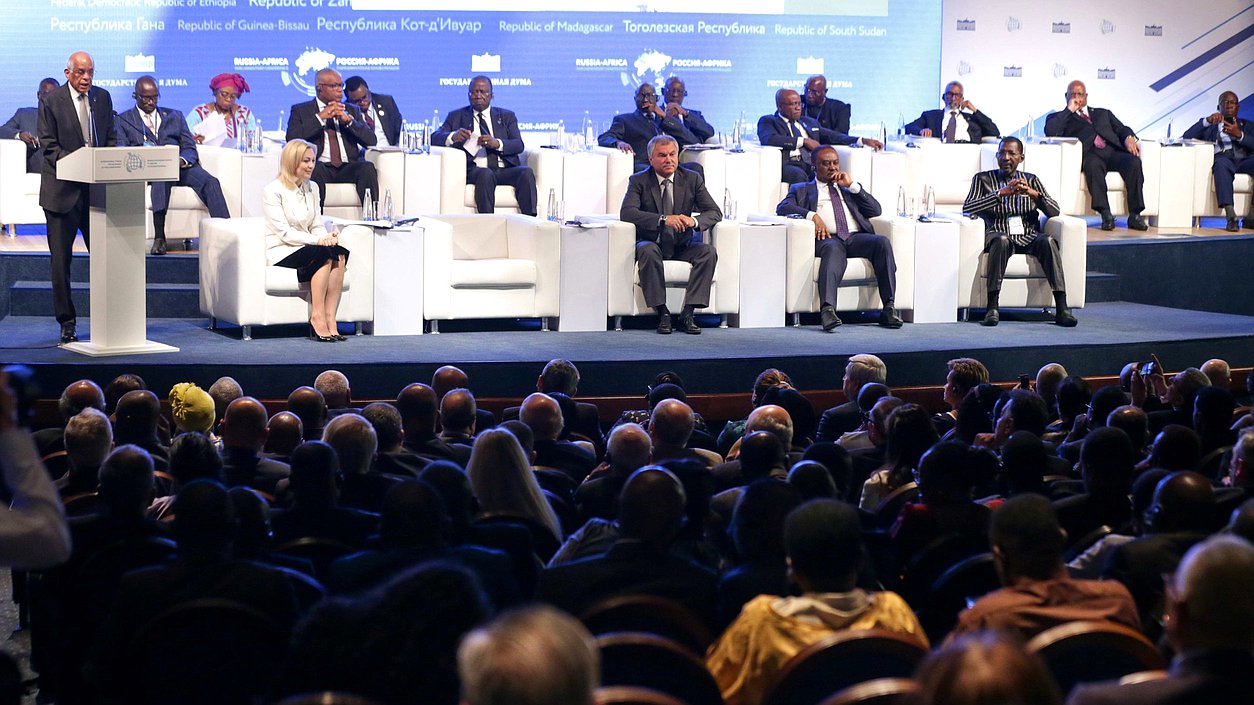
By Kestér Kenn Klomegâh
The Russian Foreign Ministry and the State Duma (the lower Chamber of Parliamentarians) have agreed to hold the next International Parliamentary Conference, “Russia – Africa”, in March. In several official reports, this International Parliamentary Conference was considered an important stage and integral part of the preparation for the Russia-Africa summit planned for late July.
Under the chairmanship of Boris Vyacheslavovich Gryzlov, the first Russia-Africa Inter-Parliamentary Conference and a special business forum with the theme “Russia – Africa: Horizons of Cooperation” was held on June 15 -17, 2010. The Federation Council and the State Duma still remember the final joint declaration made at the end of the gathering. Absolutely nothing was pursued, and nothing was achieved after that conference in 2010.
Significant change only appeared when Vyacheslav Volodin became the Chairman of the State Duma. The urgent revival of the idea to bring together African parliamentarians appeared on the political scene – a prelude to the first Russia-Africa summit in 2019.
The State Duma then, with the Ambassadors of African countries in the Russian Federation, held a preparatory meeting to brainstorm for views and opinions for consolidating the future of Russia-Africa relations. The meeting was also aimed at preparing for the proposed Inter-Parliamentary Conference Russia-Africa planned in 2019.
Vyacheslav Volodin, Chairman of the State Duma, stressed the importance of regular meetings to shape the future relations between Russia and Africa. “We have great expectations for the inter-parliamentary conference Russia-Africa which we are planning to hold in 2019. In our opinion, it will serve as a stimulus and initiate some processes aimed at the development of relations between our parliaments,” said the Chairman of the State Duma, opening that meeting in April 2019.
“We are going to provide support through the parliamentary dimension for the development of inter-parliamentary contacts in terms of the preparation of the Russia-Africa conference. It was initiated by President Vladimir Vladimirovich during the 10th Anniversary BRICS Summit in Johannesburg in July,” the Chairman of the State Duma emphasized.
During that time, it was believed that such a format would allow for productively discussing the agenda on intensifying relations, bringing together approaches on a number of issues and contributing to the preparation of the conference in the framework of agreements reached the level of heads of state. Still, various agreements are undelivered, as noted in the authoritative report titled ‘Situation Analytical Report’ complied by 25 policy experts headed by Professor Sergei Karaganov. That report was presented publicly in November 2021.
Leonid Slutskiy, Chairman of the State Duma Committee on International Affairs, expressed the hope that two-sided parliamentarians’ meetings would become regular and would be constantly held in Moscow. With the primary aim of creating the basis of long-term cooperation and the intention of supporting the steadily growing interest of Africans in geopolitical developments, Russia now plans to invite heads of African parliaments in March 2023 to Moscow.
The parliamentary platform could be used to exchange views on common problems and common issues for the African continent and the Russian Federation. In addition, as it is always noted and a standard approach, the line-up of speeches and presentations is full of anti-Western and anti-Europe confrontation instead of concentrating on development-oriented and business initiatives with African countries.
The State Duma, through constructive discussions with African parliamentarians, could possibly increase the efficiency of interaction on issues requiring joint decisions, including sustainable development, international security, environmental protection, fighting poverty and inequality and countering terrorism.
The State Duma has to outline Russia’s priorities for mutual cooperation and further offer useful comprehensive programmes, and proposals for cooperation with African countries, with the regional economic blocs and with the pan-African Union. The majority of African countries are currently looking to improve their economies and are consequently ready to welcome potential external investors with adequate investment funds, regards of political underpinnings. Understandably, geopolitical neutrality is a pragmatic approach for not dispelling potential genuine external players.
As Foreign Minister Sergey Lavrov noted in his speech delivered in July 2019 at a parliamentary forum held in the World Trade Center (WTC) overlooking the Krasnopresnenskaya Naberezhnaya in Moscow, the State Duma has to bring parliamentarians together for a common purpose of deliberating on the widest range of topical issues, such as global security, sustainable development, the fight against poverty and environmental problems.
Parliamentary diplomacy has to make significant and in-depth contributions to supporting trust and mutual understanding between countries in their search for compromises and balanced solutions to acute international problems, according to Foreign Minister Lavrov.
Interesting to note along these lines of our discussion that since that gathering in 2010, Russian and African parliamentarians have been interacting, mostly chatting over global and regional questions. Reports we have monitored show that many African legislators have visited Moscow. And in terms of reciprocity, Russian legislators have paid a number of working visits to Africa. That is highly commendable, but what African regions, what African countries and what were the results? What have been the achievements aside from raising collective voices against “neo-colonialism” and “hegemony” and further making numerous pledges and promises?
Concretely aiming at strengthening further mutual bilateral parliamentary relations, Federation Council Speaker Valentina Matviyenko headed a group of Russian senators on a reciprocal visit from May 30 – June 01, 2022, to Maputo, Mozambique. The Chairperson of the Federation Council delivered speeches to the deputies of the Assembly of the Republic of Mozambique and had a separate meeting with the Russia-Mozambique Parliamentary Friendship League.
She expressed satisfaction with the dynamic development of inter-parliamentary relations, the legal basis of which was the protocol on the development of inter-parliamentary cooperation between the Federation Council and the Assembly of the Republic of Mozambique.
“Today, we will take a new important step towards strengthening the legal framework and sign a full-fledged agreement on inter-parliamentary cooperation between the Federation Council and the Assembly of the Republic of Mozambique that meets modern realities. This will allow us to bring our inter-parliamentary contacts to a higher level and open up broad prospects for the exchange of experience in legislative activity,” Matviyenko emphasized.
In this context of bilateral economic cooperation, the Mozambican Head of State, however, expressed satisfaction with the openness that Russia has been showing high interest in expanding bilateral cooperation with Mozambique, especially in the economic and social sectors. Reports monitored from local Mozambican media as well as from both Russian and Mozambican government websites, indicated that Russia has still been looking for feasible and viable economic sectors to strengthen and broaden cooperation with Mozambique.
Speaker Valentina Matviyenko, during discussions with the Mozambican leader Filipe Nyusi, referred to the need to increase trade between Russia and Mozambique, which amounted to approximately $109 million, and described trade figure as well below its potential. Senator Matvienko then invited the Mozambican government to identify more priority areas in which cooperation could be expanded if Mozambique so agrees on this significant assignment or policy task.
After the Soviet collapse and throughout these three decades (30 years) of Russia-Mozambique relations, Russia and Mozambique have been appropriately described as “reliable and time-tested” partners in Africa. Reviewing the evolutionary processes of bilateral relations, it is about time to highlight development projects undertaken or currently in progress. But for the Highly Respected Speaker Valentina Matviyenko, requesting the Mozambican government to identify priority areas for expansion of cooperation, especially at this time in their bilateral history, seems completely out of place. Completely out, especially during the meeting with the President of Mozambique, Filipe Nyusi.
Long before the Russian delegation’s visit to Maputo, Mozambican leader Filipe Nyusi was in Kremlin in August 2019, held business talks with President Vladimir Putin and then went on to deliver and answered several questions during a special business meeting with Russian entrepreneurs at the World Trade Center. According to several reports, there again bilateral agreements were signed between Moscow and Maputo.
Earlier during the month of February 2020, the Chairperson of the Federation Council (the Upper House or the Senate), Valentina Matviyenko, headed a delegation of legislators on a three-day working visit aimed at strengthening parliamentary diplomacy with Namibia and Zambia. This visit showed Russia’s overwhelming commitment to pursuing its strategic interests and supporting its African allies.
According to an official release from the Federation Council, the visit was within the broad framework mechanism of parliamentary consultations between Russia and African countries. The key focus was on political dialogue, economic partnership and humanitarian spheres with Namibia and Zambia. In Zambia, there was an in-depth discussion construction of a nuclear plant.
The Zambian Government hopes that upon commissioning of this project, excess power generated from this plant could be made available for export to neighbouring countries under the Southern African Development Community Power Pool framework arrangement.
Under the agreement that was concluded in December 2016 on the construction of the nuclear plant was estimated at $10 billion. The processes of design, feasibility study and approvals regarding the project concluded. Russia was unprepared to make financial commitments, and Zambia lacks adequate funds to finance the project.
Russia and Zambia would find options for financing nuclear science and technology in the African country, Chairperson of Federation Council Matvienko said at a meeting with Zambian President Edgar Chagwa Lungu. “Now the start of the construction of a centre for nuclear science and technology has been suspended due to financial issues. I would like to say that the request submitted to the Russian president is being carefully considered by the ministries and departments. I’m confident that we will jointly find options to promote funding to roll out the construction of a centre for nuclear science and technology,” she reassured.
While the significance cannot be underestimated, it is also not worrisome that the trip, full of symbolism and promises, concluded without any new major policy announcement. On the other hand, it signals another bid by Moscow to boost relations with the southern African region. Without a doubt, both Namibia and Zambia still have full-fledged commitments to scaling up traditional diplomatic ties with the Russian Federation.
Despite its highly praised global status, Russia has still lagged far and far behind, in practical terms, in economic engagement in Africa. Moscow should begin to count its achievements in Africa rather than so loud on confrontation. This confrontation approach negatively impacts Africa’s dream of continental unity. Reports show that Africa is noticeably divided, and its “unity” largely seems unrealizable. Chinese have also emphasized that Africa is a field for “cooperation” and not for “confrontation” – this position has been reported in media over the world. Waging war on “neo-colonialism” should rather be actively demonstrating investment capabilities, especially in economic sectors in Africa.
For these few years, in strengthening and expanding relations with African parliaments et cetera, African representatives have, oftentimes, reminded that the relations between Russia and Africa have a long time-tested history, all that concerning Soviet-era assistance to Africa and lined up on the principles of equality and mutual respect and that Moscow supports the principle formulated by the African countries – “African solutions to African problems” – and yet Russia’s policy objectives seem far from the African Union Agenda 2063.
World
AfBD, AU Renew Call for Visa-Free Travel to Boost African Economic Growth

By Adedapo Adesanya
The African Development Bank (AfDB) and the African Union have renewed their push for visa-free travel to accelerate Africa’s economic transformation.
The call was reinforced at a High-Level Symposium on Advancing a Visa-Free Africa for Economic Prosperity, where African policymakers, business leaders, and development institutions examined the need for visa-free travel across the continent.
The consensus described the free movement of people as essential to unlocking Africa’s economic transformation under the African Continental Free Trade Area (AfCFTA).
The symposium was co-convened by AfDB and the African Union Commission on the margins of the 39th African Union Summit of Heads of State and Government in Addis Ababa.
The participants framed mobility as the missing link in Africa’s integration agenda, arguing that while tariffs are falling under AfCFTA, restrictive visa regimes continue to limit trade in services, investment flows, tourism, and labour mobility.
On his part, Mr Alex Mubiru, Director General for Eastern Africa at the African Development Bank Group, said that visa-free travel, interoperable digital systems, and integrated markets are practical enablers of enterprise, innovation, and regional value chains to translate policy ambitions into economic activity.
“The evidence is clear. The economics support openness. The human story demands it,” he told participants, urging countries to move from incremental reforms to “transformative change.”
Ms Amma A. Twum-Amoah, Commissioner for Health, Humanitarian Affairs and Social Development at the African Union Commission, called for faster implementation of existing continental frameworks.
She described visa openness as a strategic lever for deepening regional markets and enhancing collective responses to economic and humanitarian crises.
Former AU Commission Chairperson, Ms Nkosazana Dlamini-Zuma, reiterated that free movement is central to the African Union’s long-term development blueprint, Agenda 2063.
“If we accept that we are Africans, then we must be able to move freely across our continent,” she said, urging member states to operationalise initiatives such as the African Passport and the Free Movement of Persons Protocol.
Ghana’s Trade and Industry Minister, Mrs Elizabeth Ofosu-Adjare, shared her country’s experience as an early adopter of open visa policies for African travellers, citing increased business travel, tourism, and investor interest as early dividends of greater openness.
The symposium also reviewed findings from the latest Africa Visa Openness Index, which shows that more than half of intra-African travel still requires visas before departure – seen by participants as a significant drag on intra-continental commerce.
Mr Mesfin Bekele, Chief Executive Officer of Ethiopian Airlines, called for full implementation of the Single African Air Transport Market (SAATM), saying aviation connectivity and visa liberalisation must advance together to enable seamless travel.
Regional representatives, including Mr Elias Magosi, Executive Secretary of the Southern Africa Development Community, emphasised the importance of building trust through border management and digital information-sharing systems.
Ms Gabby Otchere Darko, Executive Chairman of the Africa Prosperity Network, urged governments to support the “Make Africa Borderless Now” campaign, while tourism campaigner Ras Mubarak called for more ratifications of the AU Free Movement of Persons protocol.
Participants concluded that achieving a visa-free Africa will require aligning migration policies, digital identity systems, and border infrastructure, alongside sustained political commitment.
World
Nigeria Exploring Economic Potential in South America, Particularly Brazil

By Kestér Kenn Klomegâh
In this interview, Uche Uzoigwe, Secretary-General of NIDOA-Brazil, discusses the economic potential in South America, particularly Brazil, and investment incentives for Brazilian corporate partners for the Federal Republic of Nigeria (FRN). Follow the discussion here:
How would you assess the economic potential in the South American region, particularly Brazil, for the Federal Republic of Nigeria? What investment incentives does Nigeria have for potential corporate partners from Brazil?
As the Secretary of NIDOA Brazil, my response to the questions regarding the economic potentials in South America, particularly Brazil, and investment incentives for Brazilian corporate partners would be as follows:
Brazil, as the largest economy in South America, presents significant opportunities for the Federal Republic of Nigeria. The country’s diverse economy is characterised by key sectors such as agriculture, mining, energy, and technology. Here are some factors to consider:
- Natural Resources: Brazil is rich in natural resources like iron ore, soybeans, and biofuels, which can be beneficial to Nigeria in terms of trade and resource exchange.
- Growing Agricultural Sector: With a well-established agricultural sector, Brazil offers potential collaboration in agri-tech and food security initiatives, which align with Nigeria’s goals for agricultural development.
- Market Size: Brazil boasts a large consumer market with a growing middle class. This represents opportunities for Nigerian businesses looking to export goods and services to new markets.
- Investment in Infrastructure: Brazil has made significant investments in infrastructure, which could create opportunities for Nigerian firms in construction, engineering, and technology sectors.
- Cultural and Economic Ties: There are historical and cultural ties between Nigeria and Brazil, especially considering the African diaspora in Brazil. This can facilitate easier business partnerships and collaborations.
In terms of investment incentives for potential corporate partners from Brazil, Nigeria offers several attractive incentives for Brazilian corporate partners, including:
- Tax Incentives: Various tax holidays and concessions are available under the Nigerian government’s investment promotion laws, particularly in key sectors like agriculture, manufacturing, and technology.
- Repatriation of Profits: Brazil-based companies investing in Nigeria can repatriate profits without restrictions, thus enhancing their financial viability.
- Access to the African Market: Investment in Nigeria allows Brazilian companies to access the broader African market, benefiting from Nigeria’s membership in regional trade agreements such as ECOWAS.
- Free Trade Zones: Nigeria has established free trade zones that offer companies the chance to operate with reduced tariffs and fewer regulatory burdens.
- Support for Innovation: The Nigerian government encourages innovation and technology transfer, making it attractive for Brazilian firms in the tech sector to collaborate, particularly in fintech and agriculture technology.
- Collaborative Ventures: Opportunities exist for joint ventures with local firms, leveraging local knowledge and networks to navigate the business landscape effectively.
In conclusion, fostering a collaborative relationship between Nigeria and Brazil can unlock numerous economic opportunities, leading to mutual growth and development in various sectors. We welcome potential Brazilian investors to explore these opportunities and contribute to our shared economic goals.
In terms of this economic cooperation and trade, what would you say are the current practical achievements, with supporting strategies and systemic engagement from NIDOA?
As the Secretary of NIDOA Brazil, I would highlight the current practical achievements in economic cooperation and trade between Nigeria and Brazil, alongside the supporting strategies and systemic engagement from NIDOA.
Here are some key points:
Current Practical Achievements
- Increased Bilateral Trade: There has been a notable increase in bilateral trade volume between Nigeria and Brazil, particularly in sectors such as agriculture, textiles, and technology. Recent trade agreements and discussions have facilitated smoother trade relations.
- Joint Ventures and Partnerships: Successful joint ventures have been established between Brazilian and Nigerian companies, particularly in agriculture (e.g., collaboration in soybean production and agricultural technology) and energy (renewables, oil, and gas), demonstrating commitment to mutual development.
- Investment in Infrastructure Development: Brazilian construction firms have been involved in key infrastructure projects in Nigeria, contributing to building roads, bridges, and facilities that enhance connectivity and economic activity.
- Cultural and Educational Exchange Programs: Programs facilitating educational exchange and cultural cooperation have led to strengthened ties. Brazilian universities have partnered with Nigerian institutions to promote knowledge transfer in various fields, including science, technology, and arts.
Supporting Strategies
- Strategic Trade Dialogue: NIDOA has initiated regular dialogues between trade ministries of both nations to discuss trade barriers, potential markets, and cooperative opportunities, ensuring both countries are aligned in their economic goals.
- Investment Promotion Initiatives: Targeted initiatives have been established to promote Brazil as an investment destination for Nigerian businesses and vice versa. This includes showcasing success stories at international trade fairs and business forums.
- Capacity Building and Technical Assistance: NIDOA has offered capacity-building programs focused on enhancing Nigeria’s capabilities in agriculture and technology, leveraging Brazil’s expertise and sustainable practices.
- Policy Advocacy: Continuous advocacy for favourable trade policies has been a key focus for NIDOA, working to reduce tariffs and promote economic reforms that facilitate investment and trade flows.
Systemic Engagement
- Public-Private Partnerships (PPPs): Engaging the private sector through PPPs has been essential in mobilising resources for development projects. NIDOA has actively facilitated partnerships that leverage both public and private investments.
- Trade Missions and Business Delegations: Organised trade missions to Brazil for Nigerian businesses and vice versa, allowing for direct engagement with potential partners, fostering trust and opening new channels for trade.
- Monitoring and Evaluation: NIDOA implements a rigorous monitoring and evaluation framework to assess the impact of various initiatives and make necessary adjustments to strategies, ensuring effectiveness in achieving economic cooperation goals.
Through these practical achievements, supporting strategies, and systemic engagement, NIDOA continues to play a pivotal role in enhancing economic cooperation and trade between Nigeria and Brazil. By fostering collaboration and leveraging shared resources, we aim to create a sustainable and mutually beneficial economic environment that promotes growth for both nations.
Do you think the changing geopolitical situation poses a number of challenges to connecting businesses in the region with Nigeria, and how do you overcome them in the activities of NIDOA?
The changing geopolitical situation indeed poses several challenges for connecting businesses in the South American region, particularly Brazil, with Nigeria. These challenges include trade tensions, shifting alliances, currency fluctuations, and varying regulatory environments. Below, I will outline some of the specific challenges and how NIDOA works to overcome them:
Current Challenges
- No Direct Flights: This challenge is obviously explicit. Once direct flights between Brazil and Nigeria become active, and hopefully this year, a much better understanding and engagement will follow suit.
- Trade Restrictions and Tariffs: Increasing trade protectionism in various regions can lead to higher tariffs and trade barriers that hinder the movement of goods between Brazil and Nigeria.
- Currency Volatility: Fluctuations in the value of currencies can complicate trade agreements, pricing strategies, and overall financial planning for businesses operating in both Brazil and Nigeria.
- Different regulatory frameworks and compliance requirements in both countries can create challenges for businesses aiming to navigate these systems efficiently.
- Supply Chain Disruptions: Changes in global supply chains due to geopolitical factors may disrupt established networks, impacting businesses relying on imports and exports between the two nations.
Overcoming Challenges through NIDOA.
NIDOA actively engages in discussions with both the Brazilian and Nigerian governments to advocate for favourable trade policies and agreements that reduce tariffs and improve trade conditions. This year in October, NIDOA BRAZIL holds its TRADE FAIR in São Paulo, Brazil.
What are the popular sentiments among the Nigerians in the South American diaspora? As the Secretary-General of the NIDOA, what are your suggestions relating to assimilation and integration, and of course, future perspectives for the Nigerian diaspora?
As the Secretary-General of NIDOA, I recognise the importance of understanding the sentiments among Nigerians in the South American diaspora, particularly in Brazil.
Many Nigerians in the diaspora take pride in their cultural roots, celebrating their heritage through festivals, music, dance, and culinary traditions. This cultural expression fosters a sense of community and belonging.
While many individuals embrace their new environments, they often face challenges related to cultural differences, language barriers, and social integration, which can lead to feelings of isolation.
Many express optimism about opportunities in education, business, and cultural exchange, viewing their presence in South America as a chance to expand their horizons and contribute to economic activities both locally and back in Nigeria.
Sentiments regarding acceptance vary; while some Nigerians experience warmth and hospitality, others encounter prejudice or discrimination, which can impact their overall experience in the host country. NIDOA BRAZIL has encouraged the formation of community organisations that promote networking, cultural exchange, and social events to foster a sense of belonging and support among Nigerians in the diaspora. There are currently two forums with over a thousand Nigerian members.
Cultural Education and Awareness Programs: NIDOA BRAZIL organises cultural education programs that showcase Nigerian heritage to local communities, promoting mutual understanding and appreciation that can facilitate smoother integration.
Language and Skills Training: NIDOA BRAZIL provides language courses and skills training programs to help Nigerians, especially students in tertiary institutions, adapt to their new environment, enhancing communication and employability within the host country.
Engaging in Entrepreneurship: NIDOA BRAZIL supports the entrepreneurial spirit among Nigerians in the diaspora by facilitating access to resources, mentorship, and networks that can help them start businesses and create economic opportunities.
Through its AMBASSADOR’S CUP COMPETITION, NIDOA Brazil has engaged students of tertiary institutions in Brazil to promote business projects and initiatives that can be implemented in Nigeria.
NIDOA BRAZIL also pushes for increased tourism to Brazil since Brazil is set to become a global tourism leader in 2026, with a projected 10 million international visitors, driven by a post-pandemic rebound, enhanced air connectivity, and targeted marketing strategies.
Brazil’s tourism sector is poised for a remarkable milestone in 2026, as the country expects to welcome over 10 million international visitors—surpassing the previous record of 9.3 million in 2025. This expected surge represents an ambitious leap, nearly doubling the country’s foreign-arrival numbers within just four years, a feat driven by a combination of pent-up global demand, strategic air connectivity improvements, and a highly targeted marketing campaign.
World
African Visual Art is Distinguished by Colour Expression, Dynamic Form—Kalalb

By Kestér Kenn Klomegâh
In this insightful interview, Natali Kalalb, founder of NAtali KAlalb Art Gallery, discusses her practical experiences of handling Africa’s contemporary arts, her professional journey into the creative industry and entrepreneurship, and also strategies of building cultural partnership as a foundation for Russian-African bilateral relations. Here are the interview excerpts:
Given your experience working with Africa, particularly in promoting contemporary art, how would you assess its impact on Russian-African relations?
Interestingly, my professional journey in Africa began with the work “Afroprima.” It depicted a dark-skinned ballerina, combining African dance and the Russian academic ballet tradition. This painting became a symbol of cultural synthesis—not opposition, but dialogue.
Contemporary African art is rapidly strengthening its place in the world. By 2017, the market was growing so rapidly that Sotheby launched its first separate African auction, bringing together 100 lots from 60 artists from 14 foreign countries, including Algeria, Ghana, Mali, Nigeria, Senegal, and others. That same year during the Autumn season, Louis Vuitton Foundation in Paris hosted a major exhibition dedicated to African art. According to Artnet, sales of contemporary African artists reached $40 million by 2021, a 434% increase in just two years. Today, Sotheby holds African auctions twice a year, and in October 2023, they raised $2.8 million.
In Russia, this process manifests itself through cultural dialogue: exhibitions, studios, and educational initiatives create a space of trust and mutual respect, shaping the understanding of contemporary African art at the local level.
Do you think geopolitical changes are affecting your professional work? What prompted you to create an African art studio?
The international context certainly influences cultural processes. However, my decision to work with African themes was not situational. I was drawn to the expressiveness of African visual language—colour, rhythm, and plastic energy. This theme is practically not represented systematically and professionally in the Russian art scene.
The creation of the studio was a step toward establishing a sustainable platform for cultural exchange and artistic dialogue, where the works of African artists are perceived as a full-fledged part of the global cultural process, rather than an exotic one.
To what extent does African art influence Russian perceptions?
Contemporary African art is gradually changing the perception of the continent. While previously viewed superficially or stereotypically, today viewers are confronted with the depth of artistic expression and the intellectual and aesthetic level of contemporary artists.
Portraits are particularly impactful: they allow us to see not just an abstract image of a “continent,” but a concrete personality, character, and inner dignity. Global market growth data and regular auctions create additional trust in African contemporary art and contribute to its perception as a mature and valuable movement.
Does African art reflect lifestyle and fashion? How does it differ from Russian art?
African art, in my opinion, is at its peak in everyday culture—textiles, ornamentation, bodily movement, rhythm. It interacts organically with fashion, music, interior design, and the urban environment. The Russian artistic tradition is historically more academic and philosophical. African visual art is distinguished by greater colour expression and dynamic form. Nevertheless, both cultures are united by a profound symbolic and spiritual component.
What feedback do you receive on social media?
Audience reactions are generally constructive and engaging. Viewers ask questions about cultural codes, symbolism, and the choice of subjects. The digital environment allows for a diversity of opinions, but a conscious interest and a willingness to engage in cultural dialogue are emerging.
What are the key challenges and achievements of recent years?
Key challenges:
- Limited expert base on African contemporary art in Russia;
- Need for systematic educational outreach;
- Overcoming the perception of African art as exclusively decorative or ethnic.
Key achievements:
- Building a sustainable audience;
- Implementing exhibition and studio projects;
- Strengthening professional cultural interaction and trust in African
contemporary art as a serious artistic movement.
What are your future prospects in the context of cultural diplomacy?
Looking forward, I see the development of joint exhibitions, educational programs, and creative residencies. Cultural diplomacy is a long-term process based on respect and professionalism. If an artistic image is capable of uniting different cultural traditions in a single visual space, it becomes a tool for mutual understanding.
-

 Feature/OPED6 years ago
Feature/OPED6 years agoDavos was Different this year
-
Travel/Tourism10 years ago
Lagos Seals Western Lodge Hotel In Ikorodu
-

 Showbiz3 years ago
Showbiz3 years agoEstranged Lover Releases Videos of Empress Njamah Bathing
-

 Banking8 years ago
Banking8 years agoSort Codes of GTBank Branches in Nigeria
-

 Economy3 years ago
Economy3 years agoSubsidy Removal: CNG at N130 Per Litre Cheaper Than Petrol—IPMAN
-

 Banking3 years ago
Banking3 years agoSort Codes of UBA Branches in Nigeria
-

 Banking3 years ago
Banking3 years agoFirst Bank Announces Planned Downtime
-

 Sports3 years ago
Sports3 years agoHighest Paid Nigerian Footballer – How Much Do Nigerian Footballers Earn




